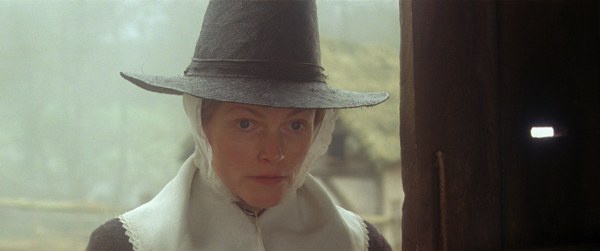
Dir: Thomas Clay | Cast: Maxine Peake, Charles Dance, Freddie Fox | UK Drama 112′
British indie filmmaker Thomas Clay is a fresh and inventive talent who returns after more than a decade with this sinister 17th century home invasion drama cum feminist awakening saga set in a remote Shropshire homestead in 1657, during the final year of Oliver Cromwell’s time as protector.
The morality tale revolves around Fanny (Peake) and her domineering ex-solider husband John (Dance) strict Puritans who live in a remotely situated wattle and daub house with their infant son Arthur. In the opening titles Clay establishes the lawlessness of the English Revolution showing how the countryside was a dangerous place to be, the Cavaliers and Roundheads were still engaged in open warfare using any weapons they could lay their hands on – at one point the local sheriff is seen dangling – his eyes gouged out – in an iron cage at a crossroads. But Clay also imbues his drama with a contemporary urban feel using expressions such as: “I’d lose that attitude if I were you” when a couple of mouthy wayfarers take refuge in their barn while the family are attending church.
The two are Thomas Ashbury (Fox) and his companion Rebecca Henshaw (Reynolds) who claim to have been the victims brigands in a nearby hostelry. Clay telegraphs doom from the opening scene, narrated by Fanny: “I never thought this would be the last time we attended church as a family”. So from then on we are just waiting for something awful to happen.
Against their better judgement, Fanny and John agree to let the couple stay, but soon regret their decision when news comes of a warrant for the arrest of a couple wanted for holding orgies and preaching on the equality of women, or what was termed “leveller” preaching. At this point you have to cast your mind back to the 17th century, a time when ordinary women were owned by their husbands, and actually believed they were second-class citizens. And Fanny is so modest she even looks up to Thomas, even though he is considerably younger.
All this has a a similar feel to Ben Wheatley’s English Revolution piece A Field in England (2013). But Clay plays it more down the line, drifting into salacious territory as Thomas and Rebecca play a subtle game of subversion, gradually asserting their authority through teasing Fanny, as John gradually loses his power, and dignity. Fanny appears to fall for Thomas’s sexual goading, up to a point – and this is a particularly uncomfortable scene to watch. But when Arthur gets involved, Fanny comes to her senses.
The Puritan era was a time of spiritual authoritarianism – but the contrasting rakish lifestyle is clearly what Clay is alluding to in Thomas and Rebecca. Only three years later Charles II would be on the throne again and the theatre, science and sexual promiscuity would flourish again, embodied by John Wilmot, the famous Earl of Rochester, aka The Libertine.
Fanny Lye is a fascinating if rather predictable film with a gripping start and ending, although it loses momentum in the second act. Peake keeps it all together with her intelligent performance as a morally unambiguous woman prepared to fight her corner. The impressive 17th century sets look convincing and Clay’s needling original score keeps us in suspense until the grim finale. MT
DIGITAL STREAMING | DVD FROM 24 AUGUST 2020